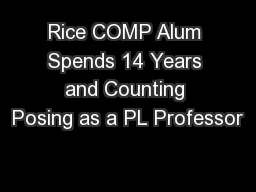PPT-Comp 110 – Introduction to Programming
Author : karlyn-bohler | Published Date : 2016-07-09
Instructor Jason Carter Computer World Hardware Memory Operating System Memory Page Program Memory Word Processor Memory Address Instruction eg add 2 to 5 Running
Presentation Embed Code
Download Presentation
Download Presentation The PPT/PDF document "Comp 110 – Introduction to Programming" is the property of its rightful owner. Permission is granted to download and print the materials on this website for personal, non-commercial use only, and to display it on your personal computer provided you do not modify the materials and that you retain all copyright notices contained in the materials. By downloading content from our website, you accept the terms of this agreement.
Comp 110 – Introduction to Programming: Transcript
Download Rules Of Document
"Comp 110 – Introduction to Programming"The content belongs to its owner. You may download and print it for personal use, without modification, and keep all copyright notices. By downloading, you agree to these terms.
Related Documents





![[eBOOK]-Programming 60: C++ Programming Professional Made Easy & MYSQL Programming Professional](https://thumbs.docslides.com/980127/ebook-programming-60-c-programming-professional-made-easy-mysql-programming-professional-made-easy-c-programming-c-language-c-for-beginners-c-mysql-programming-mysql-c-programming.jpg)
![[FREE]-Programming 58: C++ Programming Professional Made Easy & Windows 8 Tips for Beginners](https://thumbs.docslides.com/980128/free-programming-58-c-programming-professional-made-easy-windows-8-tips-for-beginners-c-programming-c-language-c-for-beginners-c-programming-programming-windows-8-c-programming.jpg)
![[BEST]-Programming 11:C Programming Success in a Day & Rails Programming Professional](https://thumbs.docslides.com/980146/best-programming-11-c-programming-success-in-a-day-rails-programming-professional-made-easy-c-programming-c-programming-c-programming-language-rails-android-programming-ruby-rails-php-css.jpg)
![[FREE]-Programming 16: Python Programming In A Day & C Programming Professional Made Easy](https://thumbs.docslides.com/980148/free-programming-16-python-programming-in-a-day-c-programming-professional-made-easy-c-programming-c-programming-c-programming-language-html-python-python-programming-coding-css-java-php.jpg)
![[READ]-Programming 5:C Programming Success in a Day Excel Shortcuts (C Programming, C++programming,](https://thumbs.docslides.com/988966/read-programming-5-c-programming-success-in-a-day-excel-shortcuts-c-programming-c-programming-c-programming-language-excel-javascript-programming-microsoft-excel-python-java-php.jpg)


